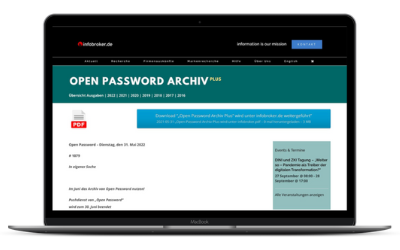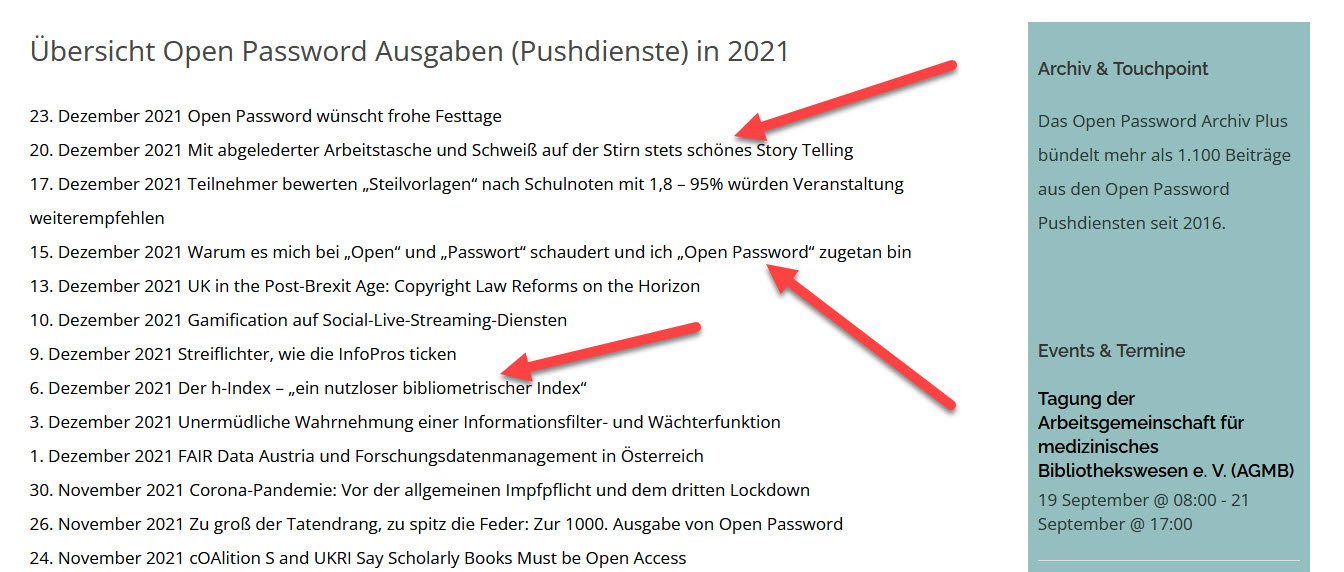Open Password – Montag,
den 16. Dezember 2019
# 680
Sabine Graumann – Graumann Consulting – Outsell – Metrics – Citations – Tatiana Khayrullina – scite.ai – National Science Foundation – National Institutes of Health – Atypon – CodeOcean – Profezo – Reproducibility Crisis – Reliability – Discovery Engine – Small Presses – Assessing research – Google Scholar – Altmetrics – AI – Co-opetition – Web of Science – Scopus – Trust – Bibliothek und Informationswissenschaft – Community – Willi Bredemeier – Stephan Büttner – Stefanb Hauff-Hartig – Elia Johannes Panskus – Elisbeth Simon – Wissen und Herrschaft – Mary Ellen Bates – Dirk Lewandowski – Vivien Petras – Informationswissenschaftliche Forschung – Deutsche Nationalbibliothek – Frank Scholze – Monika Grütters – Karlsruher Institut für Technologie – Europeana – Deutsche Digitale Bibliothek
Sabine Graumann
Zwei Jahre Graumann Consulting
Sabine Graumann, Open Passwords Information Professional des Jahres 2017, hat mit ihrer Unternehmensgründung Graumann Consulting (München) ihr zweijähriges Firmenjubiläum begangen.
Brief
Informationswissenschaftliche Forschung
an alten und neuen Standorten
Liebe Kolleginnen und Kollegen,
am Montag, den 3. Februar 2020, veranstaltet der Hochschulverband Informationswissenschaft einen Workshop unter dem Titel
Informationswissenschaftliche Forschung im institutionellen Zusammenhang: Traditionelle und neue Standorte der Informationswissenschaft stellen sich vor
Die Informationswissenschaft in den deutschsprachigen Ländern hat in den letzten Jahren einige institutionelle Veränderungen erfahren. In diesem Workshop stellen sich neue und traditionelle Standorte der informationswissenschaftlichen Forschung in Überblicksvorträgen vor. Dabei soll es um das Gesamtprogramm des jeweiligen Standorts und seine Verortung im Fach Informationswissenschaft gehen. Wir loten Gemeinsamkeiten und Unterschiede aus, fragen nach Kooperationsmöglichkeiten und einer stärkeren Vernetzung der Community. Am Abend folgt die Mitgliederversammlung des Hochschulverbands Informationswissenschaft.
Das vollständige Programm finden Sie auf der HI-Website:
http://www.informationswissenschaft.org/allgemein/workshop-am-3-februar-2020-in-berlin-informationswissenschaftliche-forschung-im-institutionellen-zusammenhang/
Und direkt zur Anmeldung geht’s hier:
https://www.eventbrite.de/e/informationswissenschaftliche-forschung-im-institutionellen-zusammenhang-tickets-80265017829
Viele Grüße
Vivien Petras und Dirk Lewandowski
Outsell´s Contribution December
The Next Generation of Metrics
for Scholarly Communications
Concept of Citations:
From Volume to Quality
By Tatiana Khayrullina, Director & Lead Analyst
_______________________________________________________________________
A Brooklyn startup classifies article citations and offers a new way to measure the impact of research.
________________________________________________________________________
Important Details
________________________________________________________________________
Breadth of coverage is key for scite.ai, a Brooklyn startup founded in 2018 and funded in part by the National Science Foundation and National Institutes of Health. Its product, a metric also called scite, goes beyond just counting citations and aims to put them in context, specifying if the citations supported, mentioned, or contradicted the research in question. The accuracy of the classifications is a function of coverage of indexed content, which feeds the database of citation statements. That database is currently at 400 million citations and now growing rapidly, with 100 million being added monthly.
Domain-agnostic, scite can ingest content from any discipline that makes a testable claim, from psychology to astrophysics to biology. The algorithm works on human language that supports or contradicts something, even if the disciplines themselves may be vastly different.
Scite has launched in a beta mode and is downloadable through a browser plugin, with plans to eventually roll it out as a multi-tiered subscription service. The basic access level will remain open to aid discoverability and allow for corrections of misclassified citations by users. At the moment, there are 2,000 registered users on the platform, with 3,000 visits per day by both registered and anonymous visitors.
________________________________________________________________________
Analyst Rating: Positive Strengths and Risks
________________________________________________________________________
Scite is the next generation of metrics, building an analytical layer on top of the simple counting of occurrences. It shows promise to address the following issues of scholarly publishing:
- Reproducibility of Research: Scite can show if the research has been independently validated.
- Metrics of Quality and Impacts on Research: Scite’s scoring system surpasses counting citations and includes an assessment of the context of the citation.
- Discovery of Research: Searching by scite score can be more efficient since only highly relevant pieces of research will be returned by the search engine.
Scite is entering a busy marketplace with players in various weight categories trying to address these three issues. However, its product stands out by offering either a new perspective or the next stage in the evolution of existing products, which positions it well as a disruptor.
In the case of reproducibility of research, companies as different as Atypon, CodeOcean, and Profeza are addressing the reproducibility “crisis” in their product offerings. However, they focus on providing access to the underlying data, whereas scite highlights studies that have been independently validated.
With funders exhorting more control over the allocation of their resources, there will be growing demand for rigorous statements and proof of the reliability of findings in grant applications. Scite aims to demonstrate that not all citations are created equal and intends to shift the concept of citation as a metric from volume to quality. Its ambition is to allow a deeper dive into the context where a citation occurred: If something was cited multiple times but then contradicted in journals with a lower impact factor, scite would uncover that.
The discovery potential of scite has an interesting caveat: It can showcase journals that do not have the highest impact factor but publish reliable research. A lesser-known journal will earn a high scite score if it is well-supported by its audience and produces high-quality, independently tested research. Society journals and small presses can do well by this lens, so the scite score can offer a competitive booster for small presses and help keep their reader and author audiences engaged.
From the point of view of the researcher, there are efficiencies to be gained in filtering for the articles that have been independently supported without having to read the full text.
Scite faces risks typical for a startup, such as the pressure to scale the business up fast enough to reach sustainability before it runs out of funding. However, there are a couple of risk categories that stand out.
The first has to do with the fact that scite is getting into the sensitive topic of assessing research rather than recording that it has been cited a particular number of times. This may be taken as digging too deep both by publishers and authors, territory where some will prefer not to wander. Some may also view the fact that the assessment is done by a machine as a weakness since the algorithm behind it has to be taken on faith by most, whereas counting citations is a straightforward metric.
The other risk comes from the existing proliferation of badges and metrics: It is easy for scite to get lost and overlooked as another badge in the corner of the screen. The messaging around what a scite score represents can be confusing since it is currently three different metrics, which is too distracting to tell a coherent story in a noisy marketplace.
________________________________________________________________________
Recommended Actions for Scite
________________________________________________________________________
Scite faces the challenge of developing a voice in a crowded and fragmented market. In doing so, it must focus its marketing on educating authors and winning them over by showcasing correlations of scite scores with more familiar metrics like the impact factor as well as Google Scholar and Altmetrics.
The HSS side of scholarly communications may be more receptive initially since there are few AI tools targeting these domains, while scite has the advantage of being domain-agnostic.
Highlighting the role that the scite score can play in assessing the impact of research can prove to be a winning marketing tactic to gain exposure and acceptance both with researchers and funders. Outsell would also like to see a more intuitive use of color in the badge itself and a clearer message about what a scite score represents.
________________________________________________________________________
Recommended Competitor Actions
________________________________________________________________________
In Outsell’s opinion, this is a case of co-opetition rather than a direct threat to the existing players. Scite can complement companies providing metrics for scholarly communications, like Altmetrics or Web of Science, if the researcher/reader and funder audiences find it useful. Eventually, we envision a lot of appetite for a consolidated metric, such as Web of Science incorporating the scite score alongside the impact factor.
As a discovery engine that is open, scite is positioned more aggressively, but in the short term, its immediate competitors, like Scopus or Web of Science, are not likely to feel the pressure to counteract. In the long term, they need to look into a strategy to defend their market share against an open search engine that is also equipped with analytics. An entry-level product that is free to use could be an option to consider.
________________________________________________________________________
Outsell’s Bottom Line
________________________________________________________________________
For the larger data, information, and analytics industry, this brings to the fore Outsell’s 2019 metatheme: Trust Is the New Algorithm. Scite.ai provides an example of data-driven analytics forming an opinion; the marketing of such sophisticated products revolves around convincing the target audience that it is a valid opinion.
Deutsche Nationalbibliothek
Frank Scholze löst Elisabeth Niggemann ab
Frank Scholze ist als Generaldirektor der Deutschen Nationalbibliothek in sein Amt eingeführt worden. Zuvor wurde Dr. Elisabeth Niggemann in den Ruhestand verabschiedet. Sie hatte das Amt der Generaldirektorin seit 1999 inne. Frank Scholze tritt sein Amt am 1. Januar an.
Kulturstaatsministerin Monika Grütters würdigte Frau Niggemann: „Frühzeitig erkannte sie die Chancen der Digitalisierung und hat die neuen Herausforderungen mit Innovationsgeist, Weitblick und Entschlossenheit gemeistert. Sie hat einen wesentlichen Beitrag daran, dass das kulturelle Erbe heute in großem Stil öffentlich zugänglich ist.“
Frank Scholze, Jahrgang 1968, hat Bibliothekswesen, Kunstgeschichte und Anglistik studiert. Er war seit 2010 Direktor der Bibliothek des Karlsruher Instituts für Technologie. Er will die Deutsche Nationalbibliothek als „kulturelles Gedächtnis der Vergangenheit und der Zukunft“ weiterentwickeln.
In die Amtszeit von Elisabeth Niggemann fiel die Novellierung des Gesetzes über die Deutsche Nationalbibliothek mit der Erweiterung des Sammelauftrages auf Netzpublikationen sowie die Errichtung des 4. Erweiterungsbaus der Deutschen Nationalbibliothek in Leipzig. Ihr national und international großes Engagement spiegelt sich in der Gründung der europäischen digitalen Bibliothek Europeana sowie der Entwicklung der Deutschen Digitalen Bibliothek wider.
Bibliothek und Informationswissenschaft
Wichtige Aufgabenfelder für
eine funktionierende Community
Als alleiniger Wissensspeicher hat die Bibliothek ausgedient. In der Verbindung mit der Informationswissenschaft, deren Hauptziel, neben der Forschung auch die Vermittlung der Informationskompetenz ist, liegen neue und wie wir sehen wichtige Aufgabenfelder vor, die für das Überleben einer funktionieren Community sehr wichtig sind.
Braucht die Informationswissenschaft ein neues Paradigma fragte Willi Bredemeier mit einer großen Auswahl von Fachleuten in: Zukunft der Informationswissenschaft – hat die Informationswissenschaft eine Zukunft? Wie sollen sich Lehre und Forschung den neuen Forderungen, wie der Flut an Fehl- und Falschinformationen stellen? Dieses Fragen stellt auch Stephan Büttner für unser kulturelles Gedächtnis. Was bedeutet die digitale Transformation für die Institutionen des kulturellen Gedächtnisses wie Bibliotheken, Museen und Archive? Stefan Hauff-Hartig setzt auf die Vermittlung von Informationskompetenz für den Umgang im Netz und die Fähigkeit, Falsch- und Fehlinformationen zu erkennen und einzuordnen. Diesem für die Zukunft und unseren Umgang mit dem Netz wichtigen Kompetenzen folgt auch Elia Johannes Panskus, der mit dem Einsatz von Metadaten Falsch- und Fehldaten ausmachen will (wird demnächst veröffentlicht).
Der Fake-News-Alarm (so macht Die keiner was vor) des Netzwerk Bibliothek mit seinen 7 Punkten ist ein erster Einstieg und der Ratschlag, Mitarbeiter in der Bibliothek zu fragen, ein guter Rat, denn zwei oder drei sehen oft mehr als einer allein. Aber es ist nur ein Anfang und bei der zu erwartenden Verbreitung des Phänomens kein ausreichender Schutz.
In: Elisabeth Simon, Schwarmintelligenz, Echokammer und Verschwörungstheorien, https://wissenundherrschaft.wordpress.com/2019/12/10/schwarmintelligenz-echokammer-und-verschwoerungstheorien/
Anzeige

FAQ + Hilfe



